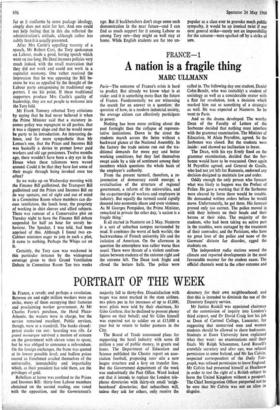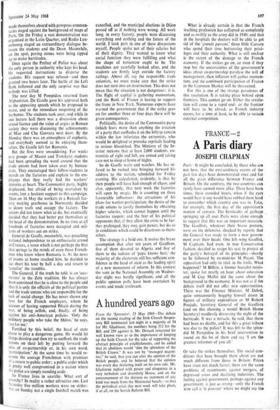PORTRAIT OF THE WEEK
In France, a revolt; and perhaps a revolution. Between six and eight million workers were on strike, many of them occupying their factories and proclaiming worker government. At Mr Charles Forte's purchase, the Hotel Plaza- Athenee, the waiters were in charge, but the service remained excellent. Public services, though, were at a standstill. The banks closed: petrol stocks ran out: hoarding was rife. Le grand monarque survived a motion of censure on the government with eleven votes to spare; but he was obliged to announce a referendum. On the foreign exchanges, the franc was quoted at its lowest possible level; and bullion prices soared as Fenchmen availed themselves of the universality, immutability and impartiality which, as their president has told them, are the privileges of gold.
Rebellion at home was confined to the Prices and Incomes Bill : thirty-four Labour members abstained on the second reading, one voted with the opposition, and the Government's
majority fell to thirty-five. Dissatisfaction with wages was most marked in the state airlines. BEA pilots put in for increases of up to L1,000, BOAC pilots were told by their chairman, Sir Giles Guthrie, that he declined to present phony figures on their behalf; and Sir Giles himself was expected not to soldier on at £15,000 a year but to return to lusher pastures in the City.
The Board of Trade announced plans for supporting the hotel industry with some £8 million a year of public money, in grants and loans. The Department of Education and Science published the Chester report on asso- ciation football, proposing inter alit a new league structure and a levy on transfer fees. But the Government department of the week was undoubtedly the Post Office. Word leaked out that it intends to replace the London tele- phone directories with thirty-six small 'neigh- bourhood' directories; that subscribers will, unless they ask for others, only receive the directory for their own neighbourhood; and that this is intended to diminish the use of the Directory Enquiry service.
Mr Justice Roskill was appointed chairman of the commission of inquiry into London's third airport, and Dr David Craig lost his job as Dean of Cartmel College, Lancaster, for suggesting that unmarried men and women students should be allowed to share bedrooms. Students at Essex University have explained what they want: no examinations until their finals. Mr Ralph Schoenman, Lord Russell's erstwhile secretary and alter ego, was refused permission to enter Ireland, and Mr Ian Colvin, respected correspondent of the Daily Tele- graph, was refused permission to leave England. Mr Colvin had presented himself at Heathrow in order to test the right of a British subject to leave the United Kingdom without a passport. The Chief Immigration Officer purported not to be sure that Mr Colvin was not an alien in disguise. made themselves absurd with pompous commen- taries staged against the background of maps of Paris. On the Friday a vast demonstration was organised in the Latin Quarter, and Radio Lux- embourg staged an extraordinary dialogue be- tween the students and the Dean. Meanwhile, on the spot, paving stones were being ripped up to make barricades. Once again the Prefect of Police was about the only person in authority who kept his head.
He requested instructions to disperse the students. His request was refused—and then granted two hours later. The battle of the Left Bank followed and the only surprise was that nobody was killed.
The next day M Pompidou _returned from Afghanistan. De Gaulle gave his approval both to the appeasing speech which he proposed to make, and to the immediate reopening of the Sorbonne. The students took over, and while in one lecture hall there was a discussion about sexual licence and the value of orgies in Roman society they were discussing the achievements
of Mao and Che Guevara next door. By the Monday there was an atmosphere of euphoria, and everybody seemed to be enjoying them- selves. De Gaulle left for Rumania.
But the fires were smouldering. For weeks past groups of Maoist and Trotskyist students had been spreading the word around that the trade unions had been taken over by bureau- crats. They encouraged their fellow-students to march on the factories and explain to the em- ployees that they really had the workers' interests at heart. The Communist party, highly displeased, but afraid of being overtaken by events, lent a hesitant support to this campaign. Then on 16 May the workers in a Renault fac- tory making gearboxes in Normandy decided to down tools and occupy the factory. The unions did not know what to do, but eventually decided that they had better put themselves at the head of the demonstration. In no time at all hundreds of factories were occupied and mil- lions of workers out on strike.
General de Gaulle, meanwhile, was preaching national independence to an enthusiastic crowd in Craiova, a town which is not perhaps the first that springs to the minds of even those French- men who know where Rumania is. As the news of events at home reached him, he decided to cut short his tour by half a day and return to 'canalise' the troubles.
The General, if the truth be told, is an 'ouv- rieriste' in the Zola tradition. He has always
been convinced that he is close to the people and that it is only the officials of the political parties and the trade unions who are responsible for the lack of social change. He has never shown any love for the French employers, whom he accuses of having supported Main during the
war, of being selfish, and,. finally, of being against his anti-American policies. 'Only the ordinary people who take the Mdtro,' he says, `are for me.'
Fortified by this belief, the head of state chose to play a dangerous game. He would let things develop and then try to outflank the trade unions on their left by putting forward the
idea of co-partnership or, in his own word-, `participation.' At the same time he would re- assure the average Frenchman with promises of a return to public order : a public order which is pretty well compromised in a nation where the police are simply standing aside.
So France lives in anarchy. What sort of anarchy? In reality a rather attractive one. Last Saturday five million workers were on strike: but on Sunday not a single football match was
cancelled, and the municipal elections in Dijon passed off as if nothing were wrong. All week long, in every factory, people were discussing everything and nothing and the future of the world. I took part in one of these discussions myself. People spoke not of their salaries but of their dignity. They wanted to know what social function they were fulfilling and what the shape of tomorrow ought to be. The machines are carefully looked after, and the students are firmly kept outside the factory railings. Above all, say the responsible trade unionists, we must make sure that the strike does not turn into an insurrection. This does not mean that the situation is not dangerous: it is. The flight of capital is gathering momentum, and the Bank of France is having to support the franc in New York. Numerous experts have warned the government that if the strike goes on for another three or four days there will be grave consequences.
Politically, the desire of the Communist party (which fears more than anything the creation of a party that outflanks it on the left) to remain within the law infuriates the extremists, who would be delighted to provoke reprisals leading to serious bloodshed. The Ministry of the In- terior reckons that at least 2,000 students, ex- tremists of right and left, are armed and taking care not to sleep at home of nights.
So de Gaulle waits and watches. He has re- fused to be rushed into bringing forward his address to the nation, scheduled for Friday evening. His calculation, evidently, is that by then people will have had enough of chaos, and also, apparently, that next week the factories will open by magic. He is counting on three favourable influences: the attractions of his plans for worker-participation; the desire of the trade unions to justify themselves by obtaining higher salaries, which cannot happen until the factories reopen; and the fear of his political opponents that, if they allow the crisis to be fur- ther prolonged, they may gain power, but do so in conditions which could be disastrous to them- selves.
The strategy is a bold one. It makes the brave assumption that after ten years of Gaullism, five of them devoted to Algeria and five of them to the tedium of 'papa knows best,' the majority of the electorate still has sufficient con- fidence in the head of state as the leading spirit of a new movement of reform. In this context the vote in the National Assembly on Wednes- day oight was hardly significant, and all the public opinion polls have been overtaken by events and made irrelevant.
What is already certain is that the French teaching profession has collapsed as completely and as swiftly as the army did in 1940; and that in the hospitals the doctors will be able to get rid of the `grands patrons,' those little Caesars who spend their time buttressing their privi- leges and their authority. What is still unclear is the extent of the damage to the French economy. If the strikes go on, or even if they stop but the uncertainties of the government's ideas about co-partnership paralyse the will of management, then inflation will gather momen- tum, and the continued participation of France in the Common Market will be threatened.
For this is one of the strange paradoxes of this revolution. It is taking place behind open frontiers. This cannot go on. Either the revolu- tion will come to a rapid end : or the frontier will have to be closed, as French industry ceases, for a time at least, to be able to sustain external competition.







































 Previous page
Previous page